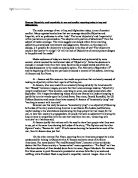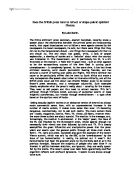Most nouns will behave in the manner of the common count noun. As shown they can occur in front of both the definite and indefinite article and form plurals. The formation of plurals leads to the frequently used defining quality that a count noun can be counted. (Huddleston et al: 2002:326) Although this variety of noun is most frequently used it is by no means the most typical. There are cases in which this noun cannot be used; it cannot stand alone without any modification nor can it be divided by a partitive such as – a bit of. Conversely common count nouns can be divided by partitives but this is only because they are viewed as a boundless whole (Quirk et al, 1979:130). This view makes them uncountable so common non-count nouns cannot form plurals. They can occur in front of the definite article but not the indefinite. Huddleston et al (2002:335) suggests that a large proportion of nouns occur as mass nouns. These nouns can occur in either the count or non-count positions. A mass noun can take both articles and be sub divided by a partitive. Moreover it can be counted and therefore form plurals. Also it can stand alone without modification or a determiner. A mass noun has no restrictions on where it can occur whereas both common count and common non-count do. For this reason and in line with Huddleston’s et al (2002:335) view that mass nouns are “an extremely widespread phenomenon” mass nouns will be taken as the most prototypical members of this sub class of nouns. This is because they have the most regular pattern; they are applicable in the greatest number of situations. If mass nouns are the most prototypical then both common count and common non-count are further away form them on the sliding scale of gradience. Further still would be proper nouns. Proper nouns will be considered in individual categories because there is a large amount of variation from the general rule in each.
Proper nouns will not form with either of the articles nor take a plural. They do not generally share many of the characteristics of common nouns this is mainly because they lack article contrast. The reason for this, as proposed by Huddleston et al (2002:517) is that one of the defining qualities of a noun is that it is by nature definite. There is therefore no need for the word to be additionally defined by the use of the definite article. There are exceptions to this rule, proving that even within categories of nouns there is a large amount of variation from the set rules that the category sets out (Quirk et al, 1985:288). Firstly exceptions in proper names will be looked at. Generally a proper name will not take the definite article these sorts of names, to use Huddleston’s et al (2002:517) terminology, are strong proper nouns. Weak proper nouns are nouns that take the definite article. In cases where an imperial title is used such as in the Emperor Napoleon then the rule changes to allow the use of the definite article. The names of reverends will always be marked with the definite article both in the written and spoken form such as in the Reverend John Smith. The rule also changes for titles of peerage when followed by an “of” phrase such as in the Prince of Wales. There is further variation of proper nouns in temporal names.
Quirk et al (1985:292) say that the strong type of temporal name has no article when it is used to refer to dates in the calendar as recurrent items, these can include months or days of the week and religious festivals or periods. However when these words refer to individual periods of time or when they refer, as a group, to more than one occasion, they change to the weak form of the noun and take the article. Quirk et al (1985:292) states that when in the weak form they often behave more like common nouns. For example when referring to a recurring event such as “The bin men come on a Tuesday” the proper noun is then able to occur in front of the indefinite article. Moreover days of the week are able to take a plural as in “ I love Fridays”. These are variations on the standard form of the temporal plural and so when considering them in terms of the gradient of nouns they would be further away from the central stereotypical version of a temporal plural. Geographical names offer more deviation from the standard formation of a proper noun.
Geographical names normally follow the format of other proper nouns in that they have no article contrast. This being said, as in other types of proper noun there is considerable room for difference. Quirk et al (1985:246) propose that there are three main situations in which the noun takes the weak form. Particular countries or regions take the definite article; examples include the Ukraine or the Sarr. Secondly the definite article is used with plural names such as the Hebrides. Huddleston et al (2002:517) state that plural geographic nouns will always be weak. The last deviation that Quirk gives is for names that end in a compass point; such as the Middle East.
Proper nouns take those three main forms: proper names, temporal names and geographical names. In each subclass the variation from the standard form has been very similar. As a standard the irregularity in this variety of noun is that some nouns on some occasions transform to the weak form. When looking at the gradient now mass nouns would be the most prototypical with common count and non-count nouns further away and proper nouns further away still. Any irregularities within these classes would then place those words further away from the specific class of noun that they belong to. Mass, count and non-count nouns and proper nouns can also be sub classified by number, whether the noun is singular or plural. On the gradient this will cause further sub-division and increase the dispersion of the nouns from the most prototypical.
Quirk et al (1985:297) explains that there are three main number classes. These include singular invariable nouns, plural invariable nouns and variable nouns. In addition to this there are two sub classes regular plurals and irregular plurals. In the discussion of number variable nouns which have a regular plural will be taken to be the most typical and so those will be considered first. A variable noun has two forms singular and plural the singular form is unmarked and so in the eyes of James Hurford (1994:139-143) would be the most basic. A large proportion of nouns are variable in this way. Normally the pronunciation and spelling of a variable noun can be largely predicted. When a variable noun is written in its plural form the plural marker –s is used to indicate its plurality, for example pen, pens. There are exceptions to this rule. If the noun ends with a sibilant and does not have a silent –e then the ending is –es not -s as in bush, bushes. Furthermore nouns that end in –o take either the ending –os as in radio, radios or –oes as in domino, dominoes. The rule taught in primary schools “drop the y add ies” is to account for the irregularity in the regular plural of words ending in –y with a preceding consonant such as sky in the plural this becomes skies. The vast majority of these nouns are common count nouns common non-count nouns and proper names belong to the category of singular invariable nouns.
Singular invariable nouns are as the name suggests singular and invariable; they have no plural form. Quirk et al (1985:299) suggests that the act of changing a non-count noun into a count noun requires a process of reclassification. This reclassification must be of a semantical nature. It is suggested that in certain situations it is possible to pluralize non-count nouns. Words denoting natural phenomenon or words used in great intensity or extent such as waters or sands can be made into a plural. The area in which there is the greatest amount of variation is in the domain of irregular plurals.
Irregular plurals are volatile. They are different from the other plurals in that where a regular plural can be largely predicted from the singular form an irregular plural cannot. There is variance in voicing, mutation, some plurals take an –en ending and others have zero plural. When considering voicing Quirk et al (1985:305) explains that there is a large amount of uncertainty in whether to voice a sound or not in many of the nouns ending –th. This shows that there are different types of this noun to place on the gradient scale. This provides a problem: which of these types is the most prototypical, the voiced or the unvoiced? The next type of variant possible in irregular nouns is mutation. Quirk et al (1985:306) show that noun mutates, there is a change of the vowel, on seven occasions, these include; tooth to teeth and mouse to mice. Furthermore the occurrence of the –en plural end in words such as child children or ox oxen supplement the notion that the irregular plural is by far the most unpredictable noun variety. For this reason irregular plural nouns will be considered to be furthest away from the most prototypical nouns, mass nouns.
It can be seen that the some nouns are more noun-like than others but which nouns are the most noun-like is dependant on your definition of a noun. In my opinion Mass nouns are by far the most predictable and agreeable nouns so they were taken to be the most prototypical. Further away from them on the gradient would be count and non-count nouns also regular plurals, further still would be proper names and furthest away would be irregular plurals. This essay has looked at the occurrence of count, non-count and mass nouns. Also it has considered at the degree of variation in forms of nouns such as proper nouns and plural nouns. This essay has shown that not all nouns fit precisely into the typical definition of a noun. By providing the defining qualities of a noun this essay has argued that some nouns are more noun-like than others.
Bibliography:
Huddleston, R., Pullam, G.K., (2002) The Cambridge Grammar of the English Language, Cambridge: Cambridge university press.
Hurford, J., R. (1994) Grammar: A Students Guide, Glasgow: Cambridge university press.
Quirk, R., Greenbaum, S., Leech, G. and Svartvik, J. (1985) A Comprehensive Grammar of the English language, London: Longman.
Quirk, R., Greenbaum, S., Leech, G. and Svartvik, J. (1979) A Grammar of Contemporary English, London: Longman







